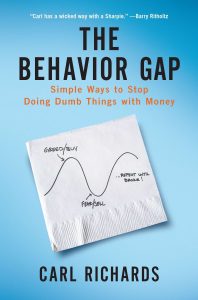When it comes to managing your own wealth, your success or failure will be determined by the decisions you make. This may seem obvious, but being human, we have a tendency to react emotionally to events outside of our control and then rationalise our decisions later. This is known as decision bias, and can take many different forms. Decision biases of our clients are the single biggest challenge we face as financial advisers and can often prove fatal to your financial plan and investment portfolio.
Our Promise to You
We will create a Lifetime Financial Master Plan and help you stick to it, through life’s twists and turns and the emotional turmoil of financial markets. Market crashes WILL happen. Temporary downturns WILL happen. It’s how you deal with your emotions at these times that will determine whether or not you will have a successful investment experience. We promise to be the guiding light in these times of darkness, ensuring you don’t cash in your chips too early and become your own worst enemy. Ensuring you stick to the plan through times of trouble is by far our biggest challenge as your advisers, but also our most important service to you and your family.
ABC's of Financial Mis-Behaviour
In order to address your behavior biases, you need to know what they are. Here is our take on the ones to look out for
Availability Heuristic
Overestimating the likelihood of events based on the recency of a similar event. Even though the recent financial crisis was a once-in-a-lifetime event, the fact that investors may have recently experienced this crisis, upward biases their expectations.
Confirmation Bias
Investors will seek out information that confirms their existing opinions and ignore contrary information that refutes them. We may decide to align with people who tell us what we want to hear, not what we need to know.
Empathy Gap
The tendency to underestimate the influence of our emotions when it comes to making decisions. Deciding how much you want to sell your business for is often driven by emotional connection, not logic, your needs or market forces.
Ikea Effect
The tendancy to assign disproportionately high value to something that has been self-built. Building an investment portfolio based on hours of research and scrutiny leads to a lack of desire to want to change things – even if it’s in your best interest to do so.
Normalcy Bias
The refusal to plan for, or react to, a disaster which has never happened before. You may never have sold a business before but having a plan to do so will improve the likely success of doing so.
Post-Purchase Rationalisation
Convincing yourself that a recent purchase was of good value, and often follows an impulse buy.
Sunk Cost Fallacy
Justifying belief in a decision based on previous decisions, despite new evidence suggesting the decision was probably wrong. Investing further in something that has proven to provide poor returns and high cost with no sign of changing – i.e. throwing good money after bad.
Bandwagon Effect
Commonly known as the herd mentality, it’s the tendancy to think we’re making the right decisions because other people are doing the same. We have seen this in the behavior of investors in the build up to the Tech Wreck in 2000 and the Financial Crises in 2008.
Decision Fatigue
The deteriorating quality of decisions made by an individual after a long period of decision making. For DIY investors this can prove fatal for an investment portfolio, can lead to avoiding decisions altogether and making rash, impulsive decisions that aren’t in their best interest.
Gambler’s Fallacy
The mistaken belief that if something happens more frequently than normal, it will happen less frequently in the future. Investment Analyst’s tend to predict a reversal in stock markets if they haven’t changed for a considerable amount of time.
Loss Aversion
Trying to avoid the emotional turmoil of ‘losing’ money. People often react more emotionally to a loss of £10,000 than a gain of equivalent value. This can be made worse by personal circumstances such as being retired or of limited resources.
Overconfidence Bias
Over-confidence in your own decision making, usually based on previous ‘successful’ decisions. If an investor has performed well in the recent past, they may conclude they are truly skilled opposed to lucky.
Regret Aversion
The tendency to avoid making decisions through fear of regret. Lack of impartial evidence about investments markets can lead to lack of confidence, indecision and inaction.

